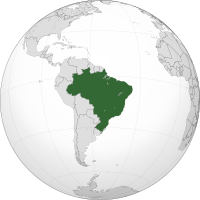
Photo from wikipedia
AbstractBackgroundPatient-reported outcomes measurement instruments (PRO) are a good way to measure results after aesthetic procedures. FACE-Q is a systematized and standardized PRO tool and was not available in Portuguese. MethodsThis… Click to show full abstract
AbstractBackgroundPatient-reported outcomes measurement instruments (PRO) are a good way to measure results after aesthetic procedures. FACE-Q is a systematized and standardized PRO tool and was not available in Portuguese. MethodsThis cross-sectional study included four stages: translation of FACE-Q, backtranslation, testing in patients who underwent facial aesthetic procedures and review of the questionnaires between September and December, 2018. Guidelines merging WHO and ISPOR’s rules were followed. ResultsTranslation was conducted by two translators, resulting in two versions, translation A and translation B, which were reconciled to generate the first Portuguese version. Reconciliation showed inconsistencies between TA and TB in 63% (n = 222) of the 353 questions, which were solved by maintaining TA in 25% of cases (n = 87), TB in 27% and a new version in 11% (n = 40) of the questions. Backtranslation showed written differences with the original FACE-Q in 64 (22.7%) of the 353 question, but only one case of semantic difference, which was corrected resulting in production of the second Portuguese version. Seven patients with a mean age of 35.8 years were interviewed to assess the difficulty in understanding the questionnaires. Four patients had no or minor difficulties understanding the questionnaire, and the other three had difficulties and suggested changes that led to a third Portuguese version. The third version was reviewed for grammar and spelling resulting in the final Portuguese version.ConclusionA Brazilian Portuguese version of the FACE-Q questionnaire was obtained maintaining equivalency with the source instrument. This will allow cross-cultural research and comparison of results between different studies.Level of Evidence VThis journal requires that authors assign a level of evidence to each article. For a full description of these Evidence-Based Medicine ratings, please refer to the Table of Contents or the online Instructions to Authors www.springer.com/00266.
Journal Title: Aesthetic Plastic Surgery
Year Published: 2019
Link to full text (if available)
Share on Social Media: Sign Up to like & get
recommendations!